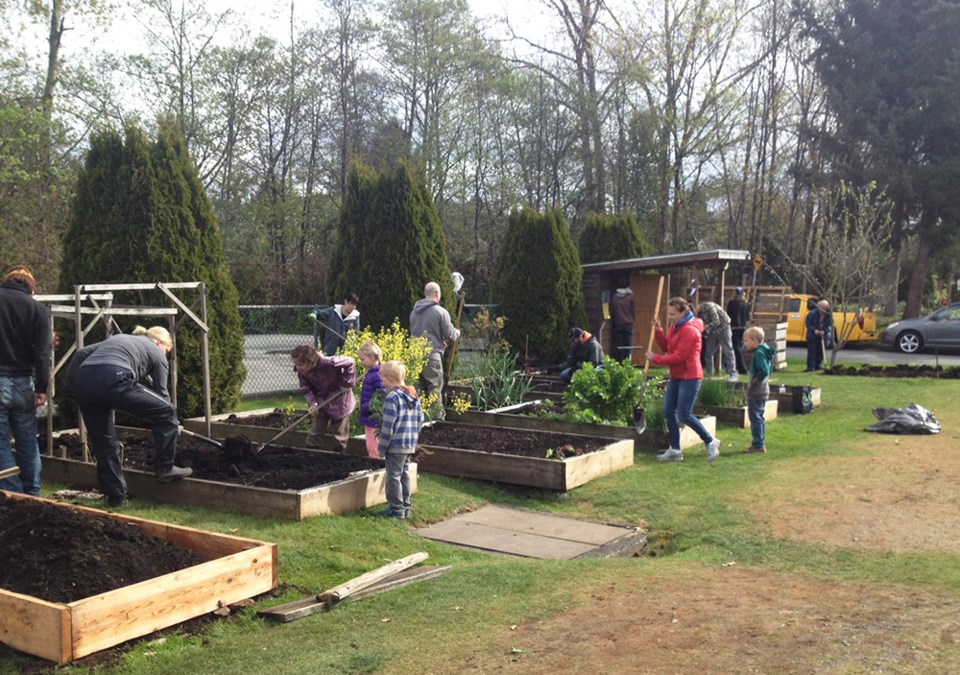Would you believe me if I said the Garden of Eden is for real and it is located in Vancouver? OK, you caught me.
But the Garden of Eatin’ is real – and it is a feature on the Victoria Drive property of the First Christian Reformed Church of Vancouver.
Part of the garden is made up of plots used by neighbourhood residents and part of the garden is used by the church to grow food for its weekly community dinners, which are open to everyone in the neighbourhood. Volunteers from the church tend that part of the garden and prepare the weekly meal.
The Garden of Eatin’ is one of a handful of community gardens in the city hosted by churches. On West 10th and Ontario, Tenth Church is home to The Healing Garden. All the food grown in the garden is organic and is used to supply Oasis Cafe, the church-run cafe that provides cheap meals to locals twice a week, and skills training to people who face barriers to employment.
Tim Wong, a staff member at Tenth Church, says the church created the garden about five years ago as part of its Creation Care ministry.
“It’s a visible example of one thing we can do to take care of creation,” he explains.
“I know some congregants who were definitely inspired by the garden to start [a garden] on their own,” he adds.
Using the food to supply the Oasis Cafe is not a logistical perk. Wong says it is intended to show that being eco-conscious cannot be separated from caring for people.
The unbreakable link between caring for the planet and caring for people is part of what keeps faith-motivated environmentalists from despairing at the current state of the planet, according to Leah Kostamo, co-founder of A Rocha Canada, an international Christian environmental group.
The Canadian branch of A Rocha is based in Surrey. Their work is based on three pillars: conservation, education and getting as many people as possible involved in sustainable agriculture through community shared agriculture. The church gardens at Tenth Church and First CRC are part of the Community Garden Network facilitated by A Rocha Canada.
Kostamo is driving in her electric car while speaking to me on speaker, explaining that most of mainstream environmental movements can be seen as a reaction to a crisis. In the 1960s the crisis was the use of the pesticide DDT, in the 70s it was nuclear bomb testing and the fate of whales, in the 80s the ozone layer was in critical condition, etc.
But if eco-care is treated as a moral imperative, Kostamo says, “then you’re responding to a call, not a crisis. Whether there is a crisis or not, your call is the same.” Instead of asking “how can I save the planet?” the operative question becomes, “what is the right way to live?”
It can be a difficult question to answer and isn’t as simple as following a list of “10 ways to save the planet,” Kostamo warns.
She says the three big decisions every person can make that have the biggest impact on the planet are “the square footage of your home, how you travel and how you vote.” But if a person is just following a list they are not likely to be motivated to examine how they make those big decisions. “You’ll take that list and you’ll do it for a week,” she warns.
Instead, Kostamo says she tells people to start by taking 10 minutes a day to get outside, whether it is in the forest, a garden, or a flower bed lining a patio.
“First, find joy in creation... learn names of the trees or birds that are around you,” she suggests. But don’t go it alone. Kostamo says having a community that is equally enthralled by the natural world is a powerful boost.
She says it becomes very natural to question not just where and how one gets food, but what impact a food source has on the environment and on humans. Buying and eating local becomes about supporting local farms and jobs, minimizing the carbon impact of the food supply, and building relationships with other people trying to do the same thing.
“Then all things flow from there and you don’t need a list,” says Kostamo.
For a list of community gardens, or how to start a community garden, visit A Rocha’s Community Garden Network.
• After graduating from Simon Fraser University with a degree in communication, Alicia moved to Rome, where she got an unexpected start covering religion. Stints in Toronto, Madrid and Toronto followed, culminating with her return home to the West Coast. Alicia has worked as a television producer and host, and is currently a freelance writer for Aleteia and Catholic News Service, as well as Leap of Faith, the Westender's blog on faith and spirituality in Vancouver.



